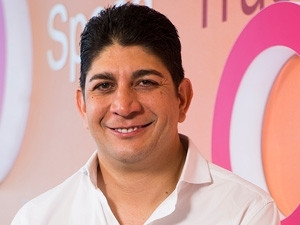
Vodacom is boosting its capital spending on fibre, long-term evolution (LTE) and 3G, to stem the tide of slower income growth from its network in the competitive local mobile market.
From next April - the start of its new financial year - network investment will be bolstered to between 14% and 17% of its top line, from the current 13%. For the last two financial years, it has spent about R7 billion a year on infrastructure, most of which has been spent in South Africa.
Growth in capital spending could be curtailed if the proposed lower interconnect rates, which have affected its bottom line, see the glide path reach 10c by 2016, it warns.
Revenue bid
While turnover across the group gained 6.6% to R34.4 billion in the first half of Vodacom's year (to September), service revenue overall was only up 2.2%. The gains in income from its network were due to its international operations, where service revenue improved 34.7%, as local service revenue was flat.
In May, Vodacom said its service revenue for the year to March only grew 2.9% in constant currency, a measure that strips out the effects of shifting foreign exchange.
CEO Shameel Joosub says accelerating its investment in the network allows it to grow capacity while dropping prices, and return to previous levels of service revenue growth. He says it is assessing spending on a country-by-country basis.
In South Africa, it wants to rollout fibre to homes and businesses, which brings with it the potential of on-demand services. It also wants to speed up LTE deployment, and provide data wherever it offers voice.
During the half-year, to September, Vodacom spent R4.9 billion on increasing capacity on its network, the bulk of which went into its local operation.
Vodacom's total base grew 9.7%, with 2.3 million new international customers, and almost a million net additions in South Africa. Joosub says its gain in market share was possible because of the increase in capacity, which allowed for more volume to move through its network, at lower prices.
During the half year, the average effective prepaid price per minute came down 16.9% to 59c, while the average price per MB dropped 16%.
Neotel boost
Vodacom, which will have 1 000 LTE base stations by year-end, also wants to add Neotel to its infrastructure mix. Joosub says Neotel gives it the ability to speed up rollout if it can overlay its network with Neotel's infrastructure.
In September, Vodacom confirmed industry talk that it was bidding to buy 100% of Neotel to add to its business unit.
The deal has yet to go through the regulatory processes and is likely to be closely examined by the Competition Commission, which must liaise with the Independent Communications Authority of SA (ICASA) when telecoms issues come up.
Although due diligence is already under way, the bid could take at least six months to wrap up. Joosub says, if it is successful, Vodacom will compete "head on" with Telkom, as the combined entity will have an opportunity to connect fibre to business parks and housing estates.
Warning bells
However, Joosub warns lower interconnect rates are difficult for the company to manage without taking drastic action. He says future investment depends on the ultimate outcome of the proposed cuts to mobile termination rates.
ICASA has proposed the current charge drops by 50% - to 20c - next year before falling to 10c in 2016. However, as it has included asymmetry, the proposal is skewed in favour of the smaller players with less than 20% of the market - Telkom Mobile and Cell C.
Joosub says once the outcome of the proposed lower rates is known, it can work out the numbers and see how to "re-jig" its business to cope. During the first half of this year, Vodacom saw a net loss of R289 million due to lower rates.
"When looking at changes to mobile termination rates, we are hopeful that the regulator will consider the crucial role that continued investment plays in facilitating further price reductions."
Share